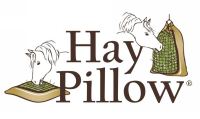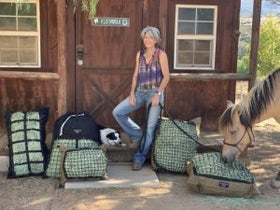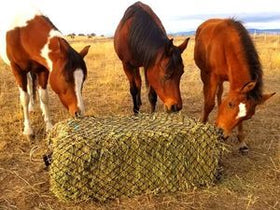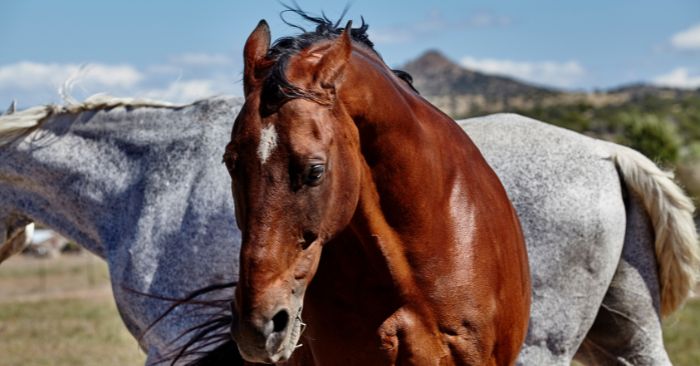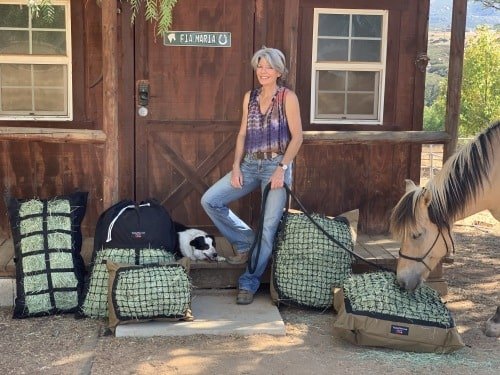Have a "Hangry" Horse at Feeding Time?
Some horses paw or are aggressive at feeding time. This is typically due to a combination of resource guarding and pain. They are anxious to self-medicate; their stomach does not feel well due to the build-up of acid and/or painful gastric ulcers. Once they start chewing and eating, they experience relief. Meal fed equines experience temporary physical relief when fed, although mentally, resource guarding persists. Read on to find out why.

The equine stomach produces acid 24 hours a day in preparation for constant uptake and can begin to empty in as little as 15-20 minutes. The average 1,000 pound equine produces 16 gallons of gastric acid per day; the stomach only has a 3 gallon capacity. The lower part of the stomach, in addition to producing the acid, receives protection by also producing mucus. The upper, or non-glandular part (squamous epithelium – similar to our skin) has no protection and is even more susceptible to damage/ulcers.
Chewing activates saliva production (an alkaline substance), which buffers gastric acid. Under natural conditions with free-choice forage, the horse will produce approximately five gallons of saliva per day (that's a lot of buffering!) and eventually “recycle” much of the water content via re-absorption prior to excretion.
Fiber present in the stomach also prevents the “splashing” of acids. Having fiber and saliva in the stomach is especially important while transporting or during any physical activity/ exercise which causes the splashing of acids.
Additionally, if your horse consumes hay too quickly, the particle size will not be reduced sufficiently or have a high enough saliva-to-forage ratio. Saliva plays a crucial role in digestion. Large amounts of dry matter lacking sufficient saliva can contribute to impaction colic and a hay belly.
Can horses eat more hay without weight gain? Learn about the surprising factors.
Horses may also experience stress (which can cause ulcers) due to isolation - and not experiencing physical interaction with other horses! Slow feeding with multiple locations levels the playing field enabling your entire herd to eat and live together full time.
Equines are herd animals - they benefit physically and psychologically from direct physical interaction. Dominant members will keep the others moving as they claim various locations. The less dominant individuals will have alternate sources to eat from. This encourages movement and can decrease cortisol levels associated with stress from being physically separated from herd members.
Hierarchy will always exist in a herd; most aggressive behavior is associated with resource guarding. Limited access to life-sustaining resources, such as food, mentally creates a need to retain control to survive. The aggression can be targeted towards herd mates and humans. Too often, the behavior is perceived by humans as the horse being mean, naughty, or even comical, which is not the case; to them, it is a matter of life or death. If free-choice forage is available with multiple sites, combative behavior typically subsides.
Here’s to supporting a natural lifestyle for happier, healthier horses! Why Do Horses Chew On Things? may also be of interest.
Helpful How-to Resources for Slow Feeding
- Sand Colic - The Surprising (Simple) Cure & Prevention
- How to Introduce & Incorporate Free-Choice Forage: A Detailed Action Plan
- Slow Feed Solutions for Any Environment
- 6 Great Reasons to Feed Your Horse from Ground Level
- 9 Benefits of Slow Feeding Horses
- 7 Slow Feed Dos and Dont's for Horses
- 7 Easy Ways to Help Prevent Colic
- Never Exercise Horses on an Empty Stomach...Ever
- Why You Shouldn't Transport Horses On An Empty Stomach
- Why Most Horse Prefer to Eat Outside
